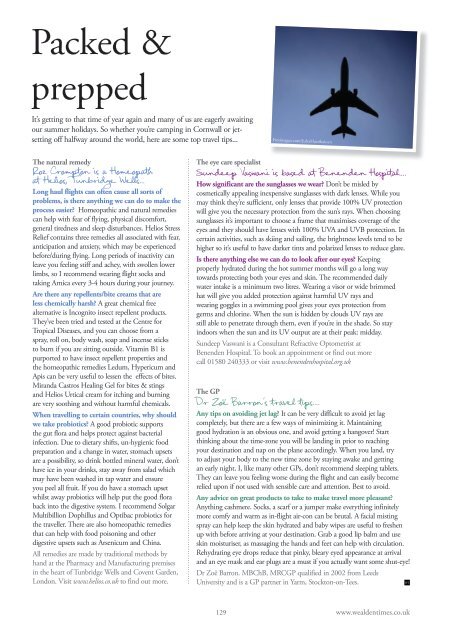Wealden Times | WT171 | May 2016 | Restoration & New Build supplement inside
Wealden Times - The lifestyle magazine for the Weald
Wealden Times - The lifestyle magazine for the Weald
Create successful ePaper yourself
Turn your PDF publications into a flip-book with our unique Google optimized e-Paper software.
Packed &<br />
prepped<br />
It’s getting to that time of year again and many of us are eagerly awaiting<br />
our summer holidays. So whether you’re camping in Cornwall or jetsetting<br />
off halfway around the world, here are some top travel tips...<br />
Freeimages.com/JuhaMartikainen<br />
The natural remedy<br />
Roz Crompton is a Homeopath<br />
at Helios, Tunbridge Wells...<br />
Long haul flights can often cause all sorts of<br />
problems, is there anything we can do to make the<br />
process easier? Homeopathic and natural remedies<br />
can help with fear of flying, physical discomfort,<br />
general tiredness and sleep disturbances. Helios Stress<br />
Relief contains three remedies all associated with fear,<br />
anticipation and anxiety, which may be experienced<br />
before/during flying. Long periods of inactivity can<br />
leave you feeling stiff and achey, with swollen lower<br />
limbs, so I recommend wearing flight socks and<br />
taking Arnica every 3-4 hours during your journey.<br />
Are there any repellents/bite creams that are<br />
less chemically harsh? A great chemical free<br />
alternative is Incognito insect repellent products.<br />
They’ve been tried and tested at the Centre for<br />
Tropical Diseases, and you can choose from a<br />
spray, roll on, body wash, soap and incense sticks<br />
to burn if you are sitting outside. Vitamin B1 is<br />
purported to have insect repellent properties and<br />
the homeopathic remedies Ledum, Hypericum and<br />
Apis can be very useful to lessen the effects of bites.<br />
Miranda Castros Healing Gel for bites & stings<br />
and Helios Urtical cream for itching and burning<br />
are very soothing and without harmful chemicals.<br />
When travelling to certain countries, why should<br />
we take probiotics? A good probiotic supports<br />
the gut flora and helps protect against bacterial<br />
infection. Due to dietary shifts, un-hygienic food<br />
preparation and a change in water, stomach upsets<br />
are a possibility, so drink bottled mineral water, don’t<br />
have ice in your drinks, stay away from salad which<br />
may have been washed in tap water and ensure<br />
you peel all fruit. If you do have a stomach upset<br />
whilst away probiotics will help put the good flora<br />
back into the digestive system. I recommend Solgar<br />
Multibillion Dophillus and Optibac probiotics for<br />
the traveller. There are also homeopathic remedies<br />
that can help with food poisoning and other<br />
digestive upsets such as Arsenicum and China.<br />
All remedies are made by traditional methods by<br />
hand at the Pharmacy and Manufacturing premises<br />
in the heart of Tunbridge Wells and Covent Garden,<br />
London. Visit www.helios.co.uk to find out more.<br />
The eye care specialist<br />
Sundeep Vaswani is based at Benenden Hospital....<br />
How significant are the sunglasses we wear? Don’t be misled by<br />
cosmetically appealing inexpensive sunglasses with dark lenses. While you<br />
may think they’re sufficient, only lenses that provide 100% UV protection<br />
will give you the necessary protection from the sun’s rays. When choosing<br />
sunglasses it’s important to choose a frame that maximises coverage of the<br />
eyes and they should have lenses with 100% UVA and UVB protection. In<br />
certain activities, such as skiing and sailing, the brightness levels tend to be<br />
higher so it’s useful to have darker tints and polarized lenses to reduce glare.<br />
Is there anything else we can do to look after our eyes? Keeping<br />
properly hydrated during the hot summer months will go a long way<br />
towards protecting both your eyes and skin. The recommended daily<br />
water intake is a minimum two litres. Wearing a visor or wide brimmed<br />
hat will give you added protection against harmful UV rays and<br />
wearing goggles in a swimming pool gives your eyes protection from<br />
germs and chlorine. When the sun is hidden by clouds UV rays are<br />
still able to penetrate through them, even if you’re in the shade. So stay<br />
indoors when the sun and its UV output are at their peak: midday.<br />
Sundeep Vaswani is a Consultant Refractive Optometrist at<br />
Benenden Hospital. To book an appointment or find out more<br />
call 01580 240333 or visit www.benendenhospital.org.uk<br />
The GP<br />
Dr Zoë Barron’s travel tips....<br />
Any tips on avoiding jet lag? It can be very difficult to avoid jet lag<br />
completely, but there are a few ways of minimizing it. Maintaining<br />
good hydration is an obvious one, and avoid getting a hangover! Start<br />
thinking about the time-zone you will be landing in prior to reaching<br />
your destination and nap on the plane accordingly. When you land, try<br />
to adjust your body to the new time zone by staying awake and getting<br />
an early night. I, like many other GPs, don’t recommend sleeping tablets.<br />
They can leave you feeling worse during the flight and can easily become<br />
relied upon if not used with sensible care and attention. Best to avoid.<br />
Any advice on great products to take to make travel more pleasant?<br />
Anything cashmere. Socks, a scarf or a jumper make everything infinitely<br />
more comfy and warm as in-flight air-con can be brutal. A facial misting<br />
spray can help keep the skin hydrated and baby wipes are useful to freshen<br />
up with before arriving at your destination. Grab a good lip balm and use<br />
skin moisturiser, as massaging the hands and feet can help with circulation.<br />
Rehydrating eye drops reduce that pinky, bleary eyed appearance at arrival<br />
and an eye mask and ear plugs are a must if you actually want some shut-eye!<br />
Dr Zoë Barron. MBChB, MRCGP qualified in 2002 from Leeds<br />
University and is a GP partner in Yarm, Stockton-on-Tees.<br />
129 www.wealdentimes.co.uk


















